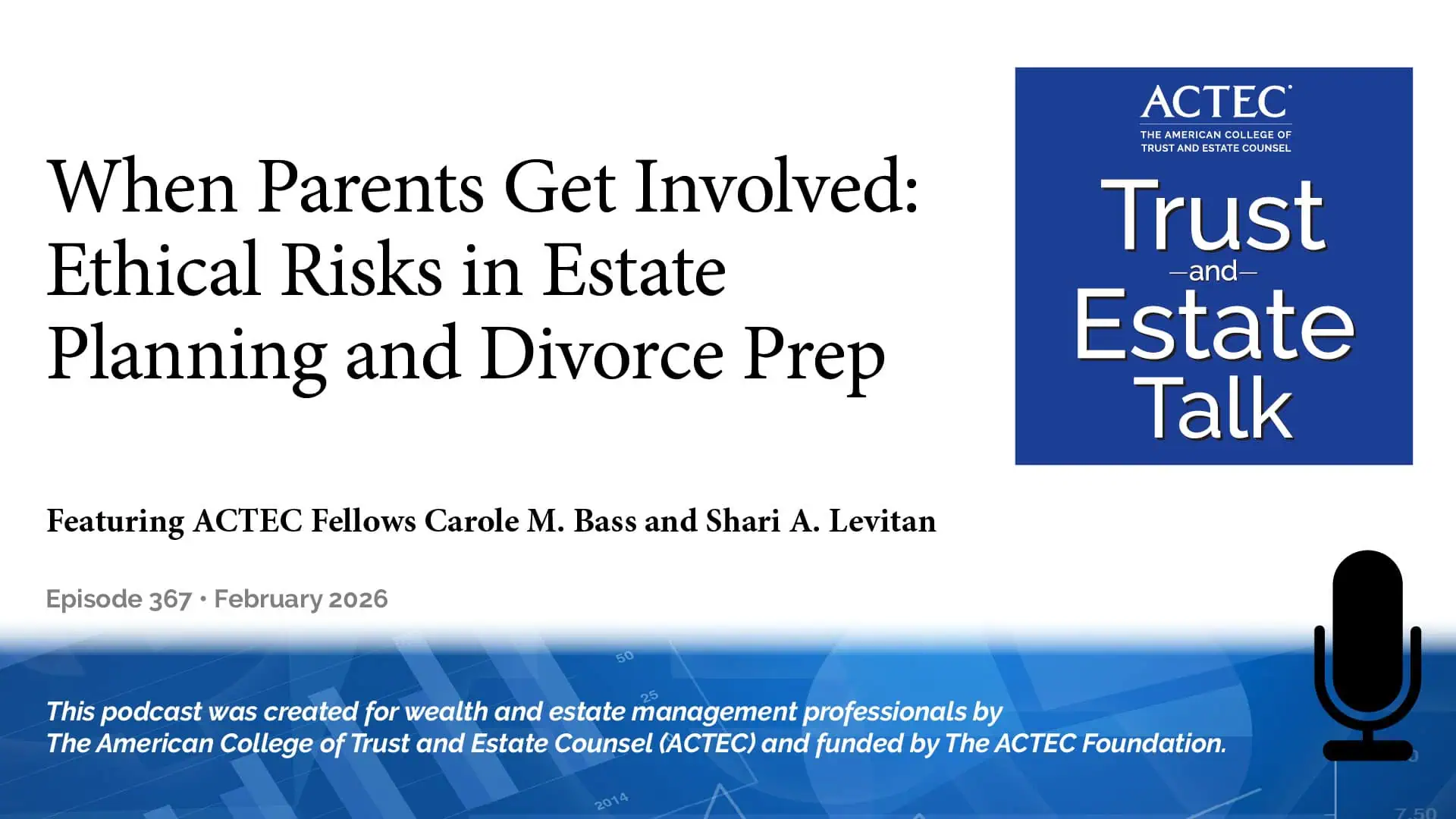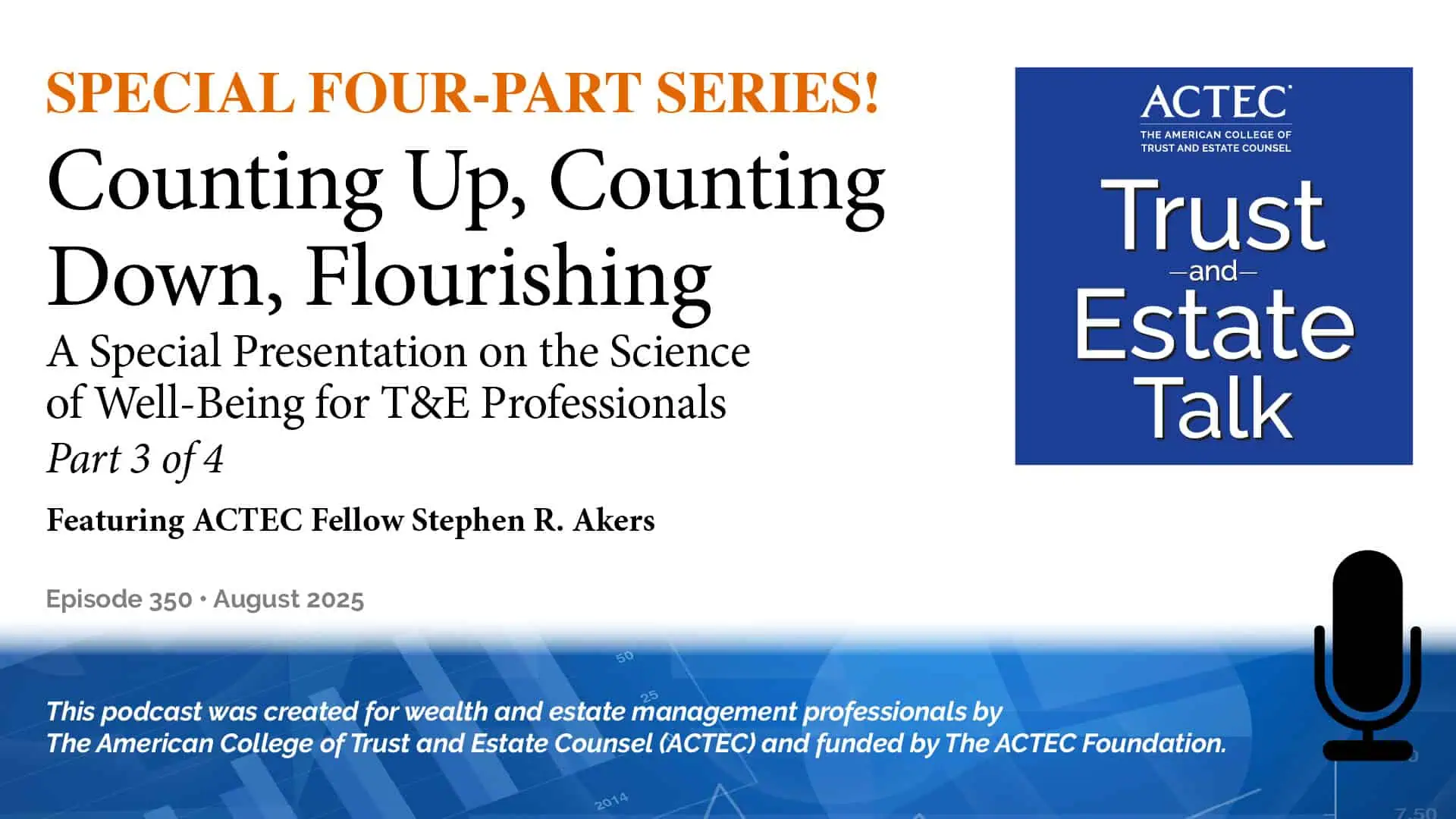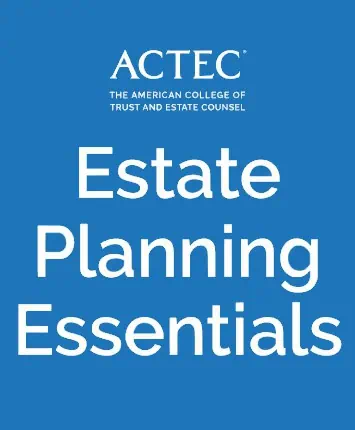Counting Down, Counting Up, Flourishing: Part 3 of 4
“Counting Down, Counting Up, Flourishing,” that’s the subject of today’s ACTEC Trust and Estate Talk.
Counting Down, Counting Up, Flourishing is a four-part special:
- Part 1: Overview
- Part 2:
- Part 3: (this podcast)
- Part 4:
DOWNLOAD THE POWERPOINT PRESENTATION
Transcript/Show Notes
This is Susan Snyder, ACTEC Fellow from Chicago.
Welcome to a special lecture featuring ACTEC Fellow and Past President Steve Akers of Dallas, Texas. One of the privileges of being ACTEC President is selecting the lecturer for the Annual Joseph Trachtman Memorial Lecture. I chose Steve Akers to deliver this Trachtman Lecture earlier this year during ACTEC’s Annual Meeting.
We have broken his 90-minute lecture, “Counting Down, Counting Up, Flourishing”, into three episodes. Today Steve shares his remaining key concepts of the intersection of positive psychology and estate planning.
Part 2: What Do We Do to Count Up, to Flourish Personally? (Continued from Part 1)
#4 — Savor the Moment
As we are counting down, make the most of each moment. Really savor and experience each moment. Favor experiences over things. Use the five senses. Savor the moment on this property, walking around. It is everywhere you look, it is absolutely beautiful. Savor the moment.
I recently read a book, The Ruthless Elimination of Hurry. What a brilliant way to describe this of savoring the moment.
Here’s kind of a flip side of this – a corollary is of sleep and savoring. We can also take times during the day to rest our brains, allowing creativity to come in.
The book Do Nothing by Celeste Headlee suggests that we take times during the day to “do nothing,” opening up to creativity, savoring the moment. She points out that some of the most successful people in the world work maybe four hours a day: Charles Dickens, Charles Darwin, Thomas Jefferson. During those times, the mind can wander and be creative, come up with new ideas. Savor the moment.
Annette Baslaw-Finger as a baby survived the Holocaust. That’s her picture on the book The Hidden Children, about 23 children who survived the Holocaust. As she was older, she asked her family members, her grandchildren, what they would like of her possessions. One of her grandsons said to her, “I would like you to give me a moral legacy.” And she wrote this just beautiful eight-piece moral legacy, one of them dealt with this issue. She speaks of putting moments in a memory bottle. “I tend to store simple moments. A grandchild runs into my arms as happy to see me as that sweetheart. They are simple moments, but moments that bring total happiness. I make sure to preserve them by putting them in my memory bottle so I can relive them whenever I feel the need.” What a wonderful picture.
The Spanish Saint Josemaría Escrivá, who was known for his teachings about the sanctification of ordinary life, put it this way, “God waits for us every day in the laboratory, in the operating theater, in the army barracks, in the university chair, in the factory, in the workshop, in the fields, in the home, in the immense panorama of life. Understand this well, there is something holy, something divine, even in the most ordinary situations, and it’s up to each one of you to discover it.” Being present in the moment, meaning in the moment.
#5 — Gratitude
This goes back to that P, positive emotion, the PERMA. Part of that is gratitude. That kind of ties to part of that is gratitude. That kind of ties to present in the moment throughout the day, have gratitude: an attitude of gratitude throughout the day.
Seligman tells of the stories, and I think Laurie Santos told of these stories as well, of people writing letters of gratitude and having just a profound impact on the person writing the letter as well as the person receiving it. Neurological studies have shown that things go on in the brain associated with times of gratitude. Again, science behind all of this.
Well, those are five principles tied pretty directly to the PERMA sort of concepts. I want to talk about some other things now and just suggest and throw out some kind of hard knocks life lessons.
#6 — Forgiveness
Number six, this is really a corollary of gratitude that is kind of the flip side of that is forgiveness. One exercise that the positive psychologist would use as a very powerful tool of dealing with anger is forgiveness.
A very successful, older and very successful, had a lot of patents, older inventor wrote down just some simple items of things that he had found helpful in life –really fun and meaningful list. Let me read a couple of them.
- Number eight was, “I could never give up Cuban cigars and booze. If a doctor tells you to stop doing things you love, find a new doctor.” I like that one.
- Number nine – “Don’t carry a grudge. There are people who are still hung up over something that happened in 1964. Let it go.”
Annette Baslow Finger, again – what one of her eight items in her moral legacy, included this item:
“The anger and resentment I retained in my body and my memory do not harm the personThat inspired these feelings
But they’re really bad for me.
Maybe I can learn to ask myself
‘Honestly, 10 years from now, what importance will this have?
In the meantime, I am poisoning this moment for sure
It will not change the situation,
I need to let it go.
I need to allow myself time to get totally angry and frustrated
And then prompt myself to move on and forget about it.’”
Forgiveness.
#7 — Prioritizing
Back in that army study that Seligman developed with the army, in one of the early sessions, there was a group of about 100 people were in the group, there were special forces soldiers, intelligence officers, psychologists, there was even a smattering of generals in the room. The instructor asked the audience — there were paper provided for them at their places in pencil — said take out the paper, you have two minutes, in 25 words or less, write down your philosophy of life. The room sat dumbfounded. How do you write a philosophy of life in 25 words or less?
Well, one person, Brigadier General Rhonda Cornum, immediately took her paper, took her pencil, started jotting very quickly. In 10 seconds, she folded the paper over, put her pencil down. At the end of two minutes, the instructor had to go to her first. General Cornum, what was on your list, your philosophy of life? This is what she wrote on her list.
“Prioritize
A
B
C
Discard C.”
We should put that in our desk every day.
ACTEC Fellow Sarah Johnson at Heckling this year, she spoke about the difficulty and limitations of how many projects we can take during the year, and she came out with this gem. “I have found that the more I say no, the more desirable I become.” Prioritizing.
And from Mike Graham, ACTEC Fellow Mike Graham, “it’s better to feel guilty for saying no than resentful for saying yes.” Mike, so much wisdom in that.
And a corollary to prioritization is procrastination. I’ve discovered “Zits,” just a wonderful cartoon strip about teenagers. “I’ve discovered that there’s actually less pressure when I don’t put assignments off until the last minute.” And mom, “Imagine that.” This is one of those hard knocks lessons we’ve all learned the hard way. We can avoid so much anxiety if we would just start attacking that project. We learn to do the dreaded task first, at least get started on it, it brings such a huge sense of freedom.
The flip side of that is, it’s not only putting off things we don’t want to do, but putting off things we do want to do. A fortune cookie, the pearls of great wisdom come from fortune cookies. I actually got this one, it said, “Whatever you want to do, do it. There are only so many tomorrows.” Great wisdom for us. If only I would believe that. I’m speaking to myself, believe me, when I say these things.
#9 — Avoid Multitasking
Studies uniformly show it is physiologically impossible for the brain to multitask. Separate parts of the brain separately are doing it, and then they’re switched tasking between those parts. And that takes more energy. One study showed that multitasking has the same effect as staying up all night. We know it, we do it anyway, but avoid multitasking.
#10 — Mistakes Happen
Fess up. Ask forgiveness and fix it. Fess up and fix it. Again, this is one of those things; we all make mistakes, we all will make mistakes. If we leave them unaddressed, it just festers, and it creates such anxiety. Fess up and fix it, the sooner the better.
And a side product of that is often respect from the person with whom you fessed up and you fixed the problem.
#11 — Respect
Respect from others, for others, for self.
Respect from others: we all need a support group. That’s that socializing concept? We all need a support group that has respect for us. Wonderful to wake up in the morning with someone that respects you. Go to the office around colleagues that respect you. Life could be miserable without that.
Respect for others. Tom Friedman, one of my most favorite writers. He is a journalist with the New York Times. Just a beautiful writer. Whether you agree with him or not, he has the clearest writing of anyone. He says, he’s found it amazing who would talk with him and let him write about them as long as they think that he respects them. “And the way they perceive respect is first and foremost if you listen. Not just waiting for them to stop talking, but deep listening.”
Respect for others and – self-respect, self-esteem, important for well-being. Let me draw a distinction. There’s self-esteem, self-respect as well. I know there’s some differences. Self-esteem takes some sort of external validation. Self-respect is internal. It is how we treat and value ourselves – that we feel that we deserve to be treated with dignity and respect.
#12 — Take a Risk
Part of living life abundantly is to take a risk. Sometimes we’ve got to take a risk. Walt Disney said when he would take an idea to his creative team, if he didn’t get push back, he would set it aside. He knew he wasn’t thinking boldly enough.
Take a risk, think big. Whether it’s eating broccoli — Sawyer and Charleigh. Whether it’s riding the Texas giant roller coaster. Whether it’s giving the Trachtman Lecture, sometimes we’ve got to do the thing that terrifies you. Take a risk.
#13—Be Authentic
Be yourself. Now this is part of flourishing. We’ll talk about that concept in positive psychology. Be authentic. Be yourself. We’re not perfect. You’re not perfect. Get over it. We all have our foibles. When we get to the point we can just be ourselves, it is so freeing and that people can see us with the foibles that we have, that’s totally fine.
I know that early in our careers we need to build credibility with clients. We need to portray a sense of having them have confidence in us, we’re beyond that now. We can just be ourselves with our colleagues as well as our clients.
A southern preacher put it this way:
“Be what you is, not what you ain’t, ‘cause if you ain’t what you is, then you is what you ain’t.
Be what you is, not what you ain’t, cause if you ain’t what you is, then you is what you ain’t.”
Part 3: Flourishing for Client Families and Client Legacies
Introduction
Transition: we talked about personal flourishing. That’s interesting. What does that have to do with a group of estate planners? Well, if we find that interesting for us, don’t we think our clients would find it interesting for themselves and for their families? Building ways that their families can flourish as well. Building our clients’ legacies.
We constantly hear that wealth can ruin their lives and their concern about that. An approach about that is to try then to attempt to design the estate plan in a way that would have a positive influence rather than a negative influence.
Some clients may feel even more strongly. I know we’ve had clients that literally there’s been a billion dollars of tax savings. Still, for that client, the burning urgency is how can I make the most for my children? How can I put things in place so that they can flourish? For those clients, we can think beyond this.
Susan Snyder: This concludes Part 3 of our special 2025 Joseph Trachtman Memorial Lecture Series: Counting Down, Counting Up, Flourishing. Please join us for the final episode, where Steve offers more recommendations and planning considerations- that will drop next week.
Latest ACTEC Trust and Estate Talk Podcasts

Trump Accounts (IRC §530A): Estate, Tax, and Wealth Planning Considerations
Analysis of Trump Accounts under Section 530A, including eligibility, contribution limits, gift tax concerns, IRA conversion rules, and comparison to Section 529 plans.

Estate Planning Considerations in Community Property States Relating to Retirement Accounts
Explore how community property laws shape IRAs, 401(k)s, beneficiary designations, and spousal rights in retirement account estate planning.

When Parents Get Involved: Ethical Risks in Estate Planning and Divorce Prep
When parents join prenup or divorce planning, ethical risks follow. ACTEC Fellows explore privilege, conflicts, and protecting the attorney-client relationship.



